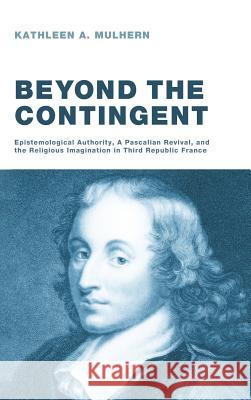Beyond the Contingent » książka
Beyond the Contingent
ISBN-13: 9781498255899 / Angielski / Twarda / 2011 / 230 str.
Beyond the Contingent
ISBN-13: 9781498255899 / Angielski / Twarda / 2011 / 230 str.
(netto: 201,41 VAT: 5%)
Najniższa cena z 30 dni: 209,17
ok. 16-18 dni roboczych.
Darmowa dostawa!
Description: In light of the contemporary struggle between science and faith, Kathleen Mulhern's timely exploration of late nineteenth-century neo-Pascalian thought both recovers a lost perspective on the ""war between science and religion"" and offers a fruitful angle of study for twenty-first-century reflection. As the science vs. religion rancor reached its early fury at the turn of the century, many devout French Catholic intellectuals struggled with the increasingly dogmatic spirit in both the Roman Catholic Church and the scientific community. The dominant ideology of scientism within the intellectual establishment of the Third Republic (1870-1940) collided with a growing authoritarianism within the Church, expressed in the 1893 papal encyclical, Providentissimus. Physicist Pierre Duhem, philosopher Maurice Blondel, and priest Lucien Laberthonniere rejected the Roman Catholic Church's Thomistic methodology and sought intellectual inspiration instead in the philosophy of seventeenth-century scientist, mathematician, philosopher, and Christian apologist Blaise Pascal. These neo-Pascalians offered an alternative to the adversarial relationship between modern culture and orthodox Catholic faith, but their ideas came to an abrupt and bitter conclusion when they ran afoul of Church authority. The narrative and contribution of the neo-Pascalians offers many insights and lessons that could helpfully inform the contemporary debates surrounding the dialogue between science and religion. Endorsements: ""Kathleen Mulhern offers a well-written and deeply documented study of how the philosophy and theology of Blaise Pascal influenced certain later thinkers (the Pascalisants) in their response to the religious and scientific controversies of their day. In so doing, she provides deep insights not only into Pascal's worldview, but also concerning early modern European intellectual history (particularly Third Republic France), the philosophy of science, and the philosophy of religion. Readers interested in any or all of these areas will be ably rewarded by studying this valuable volume."" -Douglas Groothuis Professor of Philosophy Denver Seminary ""Why Pascalian principles resonated for a community of French Catholic intellectuals at the end of the nineteenth century and why their efforts to constitute a philosophical system that simultaneously respected the accomplishments of science, affirmed the existence of God, and honored the autonomy of the individual conscience ultimately failed is the story that Beyond the Contingent unpacks with admirable rigor."" -from the Foreword by Martha Hanna University of Colorado, Boulder About the Contributor(s): Kathleen Mulhern is an historian, writer, educator, and the Managing Editor at Patheos.com. She has taught at Regis University and Colorado School of Mines, and currently teaches Church History at Denver Seminary. She holds an M.A. in French Literature, an M.A. in Church History, and a Ph.D. in History."
Description:In light of the contemporary struggle between science and faith, Kathleen Mulherns timely exploration of late nineteenth-century neo-Pascalian thought both recovers a lost perspective on the ""war between science and religion"" and offers a fruitful angle of study for twenty-first-century reflection. As the science vs. religion rancor reached its early fury at the turn of the century, many devout French Catholic intellectuals struggled with the increasingly dogmatic spirit in both the Roman Catholic Church and the scientific community. The dominant ideology of scientism within the intellectual establishment of the Third Republic (1870-1940) collided with a growing authoritarianism within the Church, expressed in the 1893 papal encyclical, Providentissimus. Physicist Pierre Duhem, philosopher Maurice Blondel, and priest Lucien Laberthonniére rejected the Roman Catholic Churchs Thomistic methodology and sought intellectual inspiration instead in the philosophy of seventeenth-century scientist, mathematician, philosopher, and Christian apologist Blaise Pascal. These neo-Pascalians offered an alternative to the adversarial relationship between modern culture and orthodox Catholic faith, but their ideas came to an abrupt and bitter conclusion when they ran afoul of Church authority. The narrative and contribution of the neo-Pascalians offers many insights and lessons that could helpfully inform the contemporary debates surrounding the dialogue between science and religion.Endorsements:""Kathleen Mulhern offers a well-written and deeply documented study of how the philosophy and theology of Blaise Pascal influenced certain later thinkers (the Pascalisants) in their response to the religious and scientific controversies of their day. In so doing, she provides deep insights not only into Pascals worldview, but also concerning early modern European intellectual history (particularly Third Republic France), the philosophy of science, and the philosophy of religion. Readers interested in any or all of these areas will be ably rewarded by studying this valuable volume.""-Douglas GroothuisProfessor of PhilosophyDenver Seminary""Why Pascalian principles resonated for a community of French Catholic intellectuals at the end of the nineteenth century and why their efforts to constitute a philosophical system that simultaneously respected the accomplishments of science, affirmed the existence of God, and honored the autonomy of the individual conscience ultimately failed is the story that Beyond the Contingent unpacks with admirable rigor.""-from the Foreword by Martha HannaUniversity of Colorado, BoulderAbout the Contributor(s):Kathleen Mulhern is an historian, writer, educator, and the Managing Editor at Patheos.com. She has taught at Regis University and Colorado School of Mines, and currently teaches Church History at Denver Seminary. She holds an M.A. in French Literature, an M.A. in Church History, and a Ph.D. in History.











